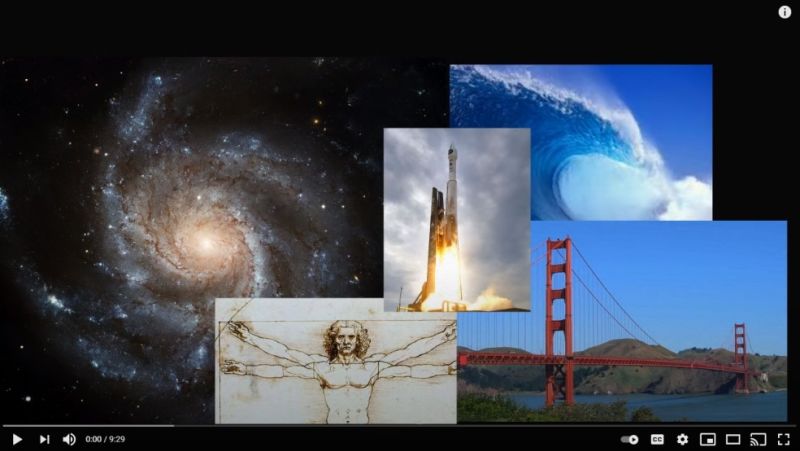
The Importance of Physics
Physics is a very broad field and it is the oldest science among all. The word “Physics” comes from the Greek word and it means “Knowledge of nature”. Physics analyzes and understands the natural phenomenon of the universe. As a result, Physics is widely considered to be the most fundamental and important of all the natural sciences. It provides the foundation for all other sciences such as chemistry, biology, oceanography, seismology, engineering, medicine, and others. It is hard to find a division of science, which does not encompass physics theories. For more information, please watch the following video:

Why Physics?
- Physics enables us to understand how and why things work around us, for example; fishing rods, LED lights, computers, cell phones, muscles, lungs, brains, ultrasound, Magnetic Resonance Imaging (MRI), ventilators, batteries, Doppler radar, headphones, cars, planes, rockets etc.
- Physics helps improve your critical thinking and problem solving skills. Apart from Physics content knowledge, Physics teaches students to think and provides preparation for many other professions such as science, engineering, computer science, software development, medicine, law, music, science journalism, finance, astronomy, biology etc.
- Physics jobs are recession proof and highly paid jobs. Since Physicists, possess additional talents and proficiency, employers value it and appreciate it. As a result, physicists earn salaries similar to computer science and engineering majors.
- Physics and Physicists can aid in solving many problems that today’s world is facing, such as the energy crisis, global warming, and climate change.
- Physics and Physicists can make our lives comfortable, joyful, and more meaningful through the invention of new technological devices, such as game consoles, virtual reality, electric cars, grocery scanners, communication satellites, solar cells, advanced cell phones, and high-tech computers, to name a few.
Employment Opportunities:
Recipients of Bachelor of Science degrees in Physics OR Physics Engineering students can find employment in the field of science, engineering, law, education, military, research and development, and business. Bachelor of Science degree in Physics OR Physics Engineering major students can get job as an Application Engineer, Lab Technician, Laser Engineer, Research Associate, Optical Engineer, Technical Specialist, Engineering Technician, Design Engineer, High School Physics Teacher, and Data Scientist/Analyst.
Physics Classes at SCTCC
Depending on students’ career paths, different groups of students will require taking different Physics courses. Currently SCTCC offers Conceptual Physics; algebra based General Physics – I, General Physics – II, calculus based Engineering Physics – I and Engineering Physics – II. SCTCC offers Conceptual Physics during fall, spring, and summer semesters; General Physics – I during the fall semester, General Physics – II during the spring semester, Engineering Physics – I during the spring semester, and Engineering Physics – II during the fall semester.
What majors might require Physics as a prerequisite?
Physics provides training for various fields. As a result, Physics is a prerequisite/required course(s) for many majors such as biology, engineering, veterinary, medicine, dentistry, radiology technology, pharmacy, sonography, physical therapy, occupational therapy, respirational therapy, optometry, and architecture
What do you learn when you take Physics courses?
Physics is a very broad subject, and it encompasses several branches. Below is a brief description of some branches of Physics disciplines.
- Mechanics – Study of Motion
- Optics – The Scientific Study of Sight and the Behavior of Light
- Thermodynamics – The Study of Heat and its Relation with Energy and Work
- Astronomy – Study of Universe
- Astrophysics – Study of Physical Properties of Astronomical Objects
- Geophysics – The Physics of the Earth
- Atomic Physics – Study of the structure of the atom, its energy states, and its interaction with particles and fields.
- Acoustic – Study of Sound and Sound Waves
- Electromagnetism – Study of interaction of electricity and magnetism
- Nuclear Physics - Study of the protons and neutrons at the center of an atom
Information about the instructor
Jay Govani, Ph.D.
I joined Saint Cloud Technical and Community College in January 2016 as a Physics Instructor. I have more than 18 years of teaching experience. During my career, I have taught various courses in the fields of Physics, Engineering, and Astronomy. Before joining SCTCC, most recently I was working as a Physics/Engineering faculty at South Central College (SCC), Mankato, MN. At SCC, I taught various courses in the field of Physics, Engineering and Mechatronics.
I have PhD in Materials Science and Engineering from University of Texas at El Paso (UTEP). I have Bachelor of Science, Master of Science and Master of Philosophy in Physics from Saurashtra University, India. My PhD research work was in the field of synthesis and characterizations of advanced materials.
My work experience also includes research work. I worked as a post-doctoral researcher at the University of South Dakota (USD) from August 2011 to August 2014. At USD, my research was focused on Growth and Characterizations of High-purity germanium (HPGe) single crystals for the fabrication of radiation detectors and high-efficient solar cells. As a researcher, I worked on different tasks such as purification of germanium ingot through zone refining process, optimization of the high purity germanium (HPGe) crystals growth rate through the simulation, modeling of growth system geometry, and optical and spectroscopic characterizations of HPGe single crystals.
I enjoy facilitating students to achieve their goals and to tap their potentials. As a faculty and post-doctoral researcher, I have worked hard to promote research among students and peers.
Guest post: Jay Govani, Ph.D.